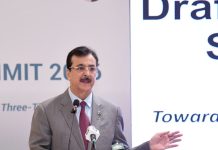By Hina Kiyani
ISLAMABAD: Special Assistant to the Prime Minister on Poverty Alleviation and Social Protection, Dr. Sania Nishtar highlighted Pakistan’s role in bolstering girls’ education at Shanghai Cooperation Organization’s (SCO) Forum on, ‘Women’s Education and Poverty Reduction’ held in Beijing.
In commemoration of the 20th anniversary of SCO, the Forum was hosted by All China Women’s Federation in cooperation with the Good-Neighbourliness, Friendship and Cooperation Commission of the SCO and SCO Secretariat in Beijing.
In her speech, Dr. Sania remarked, “Since its inception, SCO has facilitated timely dialogue and cooperation among different cultures and geographies, and today’s Forum on Women’s Education and Poverty Reduction is no different.
It is now well established that in order for countries everywhere to thrive and build back better, women and girls must be given the same opportunities to grow, learn and contribute to the workforce as their male counterparts.”
Emphasizing further, she added, “Progress is simply not possible without women. This principle sits at the core of Ehsaas. We therefore have Ehsaas 50%+ benefits for women and girls’ policy, which means that in each of Ehsaas’ programs more than 50% of the benefits are dedicated for women and girls.”
About the Ehsaas Kafaalat cash transfer program and the Ehsaas One Women One Bank Account (Ehsaas Bachat Account) programs, she said that we are on the way to supporting ten million poorest women in Pakistan. More than 8 million women have already been included.
Dr. Sania further said that Ehsaas also ensures that all beneficiaries of conditional cash transfer schemes receive higher stipends for girls. Ehsaas also has a new policy to incentivize girls’ education, which is evidenced in a recent decision to grant a higher stipend for girls in our education conditional cash transfer program.
“Originally, the program provided small stipends for households planning to send both girls and boys to primary school. Now, households are given a higher amount for choosing to educate girls and are offered support through higher secondary school levels. Additionally, we give a bonus to girls who complete the 5th grade predicated on the understanding that this will facilitate continuation of education to the secondary level, as drop out is very high at this stage”, she said highlighting Ehsaas’ women centric policy.
Dr. Sania, on Ehsaas Undergraduate Scholarships, added, “Completing higher education, however, still remains a major barrier for women to ultimately graduate out of poverty. That’s why we launched the Ehsaas Undergraduate Scholarship program, which gives need- and merit-based scholarships to hundreds of thousands of students in Pakistan, with half of all scholarships, strictly half of all scholarships strictly reserved for girls. By placing women and girls at the centre of all our programs, Ehsaas is striving towards a healthier, stronger and more resilient country.”
The forum provided a platform for SCO member states to share best practices and successful experience in promoting education and alleviating poverty for women, while reinforcing mutual understanding, friendship and cooperation, and to facilitate the achievement of relevant goals laid out in the Beijing Platform for Action and the 2030 Sustainable Development Agenda.
Other key speakers were–Speaker of the Federation Council of the Federal Assembly of the Russian Federation, First Lady of of Uzbekistan, Deputy Prime Minister of Tajikistan, First Lady of Afghanistan, Vice President of Iran, USG of the UN and Executive Director of UN Women, Secretary-General of SCO, Chairperson of the National Commission for Women and Demographic Policy under the President of Kazakhstan, President of the Congress of Women of Kyrgyz Republic, and President of Mongolian Women’s Federation.
The forum was held both online and offline with women dignitaries, ministers in charge of women affairs, and heads of national women organizations from SCO countries participating through virtual platform, ambassadors, and diplomats from relevant countries in China, as well as representatives from relevant departments of Chinese government, think tanks and women representatives from grassroots level.
The event was interpreted simultaneously in English, Chinese and Russian languages.





